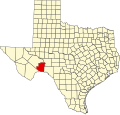Sanderson, Texas | |
|---|---|
 Terrell County Courthouse in Sanderson | |
 | |
| Coordinates: 30°09′03″N102°24′29″W / 30.15083°N 102.40806°W [1] | |
| Country | United States |
| State | Texas |
| County | Terrell |
| Area | |
• Total | 4.2 sq mi (10.8 km2) |
| • Land | 4.2 sq mi (10.8 km2) |
| • Water | 0 sq mi (0.0 km2) |
| Elevation | 2,868 ft (874 m) |
| Population (2020) | |
• Total | 664 |
| • Density | 159/sq mi (61.5/km2) |
| Time zone | UTC-6 (Central (CST)) |
| • Summer (DST) | UTC-5 (CDT) |
| ZIP code | 79848 |
| Area code | 432 |
| FIPS code | 48-65084 [2] |
| GNIS feature ID | 1346563 [1] |
Sanderson is a census-designated place (CDP) in and the county seat of Terrell County, Texas, United States. [3] The population was 664 at the 2020 census. Sanderson was created in 1882 as a part of neighboring Pecos County. It became the seat of Terrell County in 1905.


